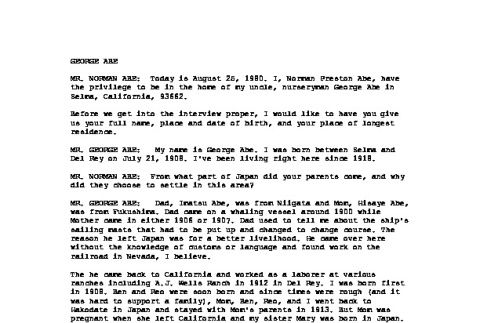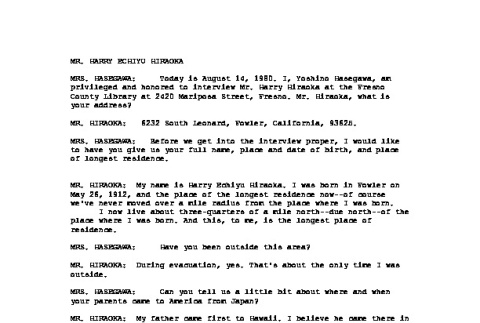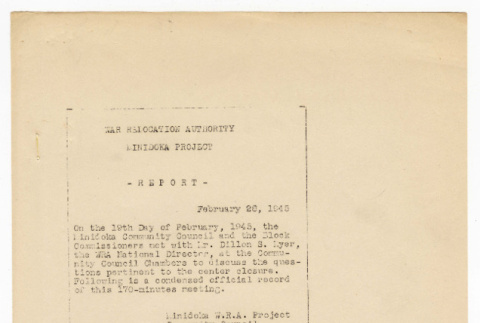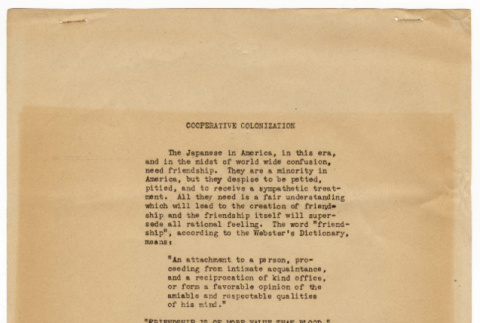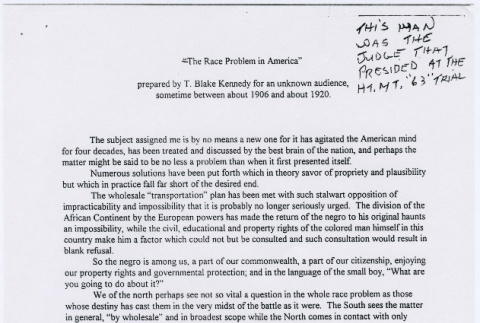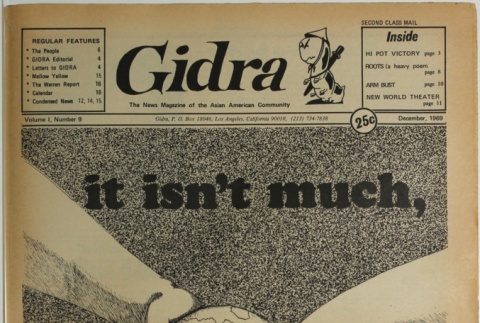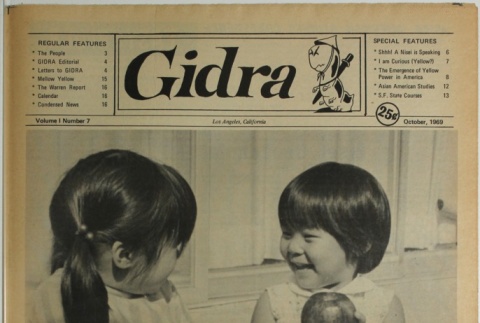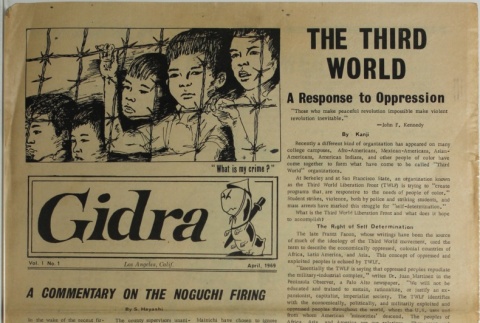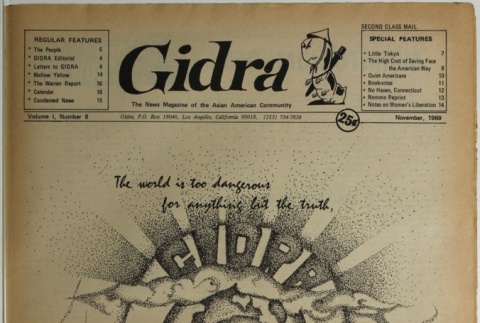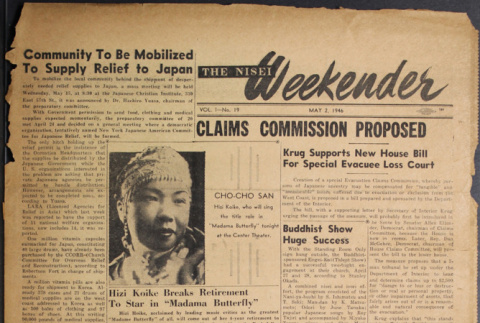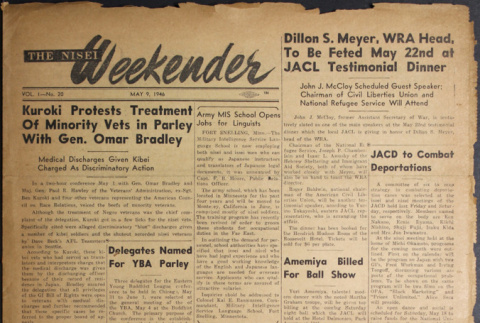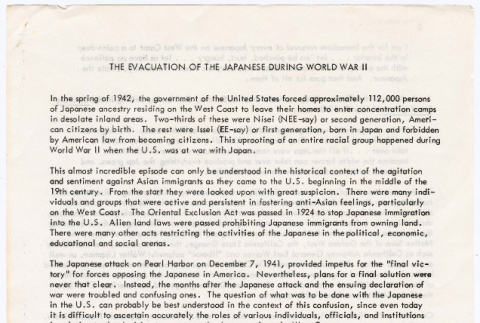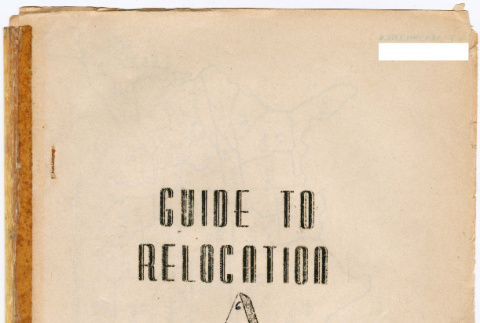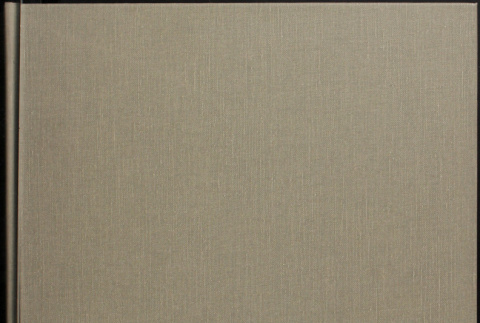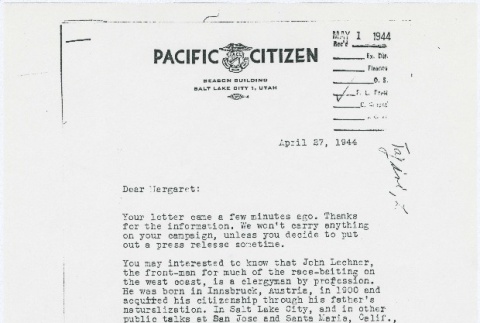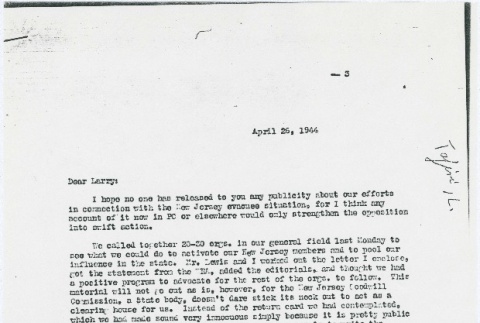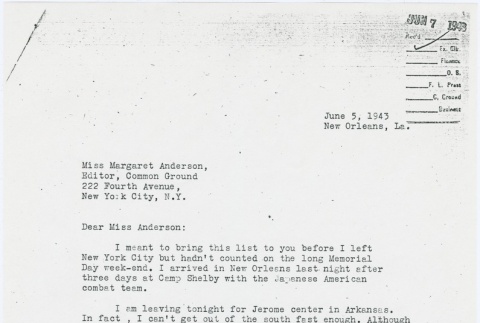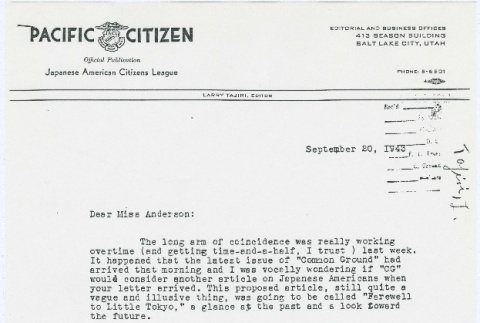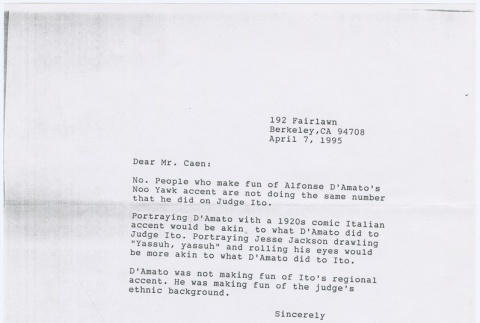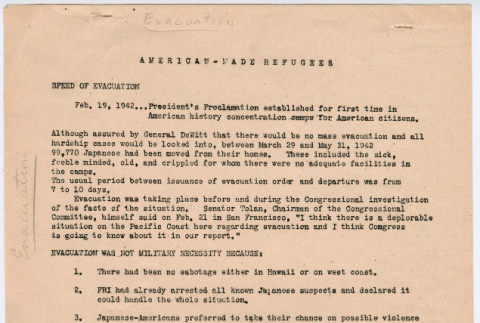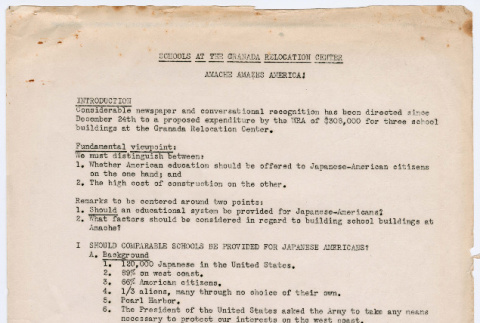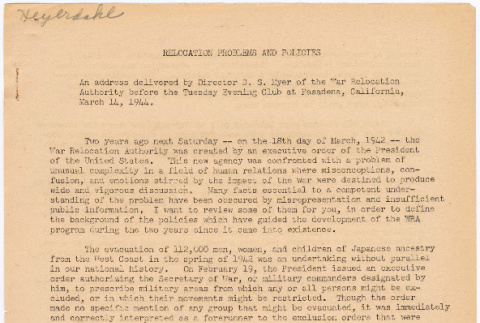Race and racism
Race and racism
(336)
336 items
336 items
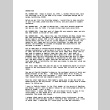
doc
George Abe (ddr-csujad-8-1)
Oral history interview with George Abe. Information on the oral history project is found in: csuf_stp_0012A; Glossary in: csuf_stp_0014. See this object in the California State Universities Japanese American Digitization project site: FCPL Abe, George
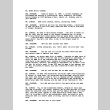
doc
Mr. Harry Echiyu Hiraoka (ddr-csujad-8-87)
Oral history interview with Mr. Harry Echiyu Hiraoka. Information on the oral history project is found in: csuf_stp_0012A; Glossary in: csuf_stp_0014. See this object in the California State Universities Japanese American Digitization project site: FCPL Hiraoka, Mr Harry Echiyu

av
Oral history with Lillian Baker (ddr-csujad-29-383)
An oral interview with Lillian Baker, founder of the Americans for Historical Accuracy and opposer of the words "concentration camp" to describe incarceration camps during WWII. The interview was conducted for the Japanese American Oral History Project by California State University, Fullerton. Transcript is found in item: csufccop_jaoh_0946. See this object in the California State Universities …
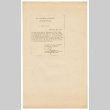
doc
Meeting of the Community Council and the Block Commissioners with Mr. Myer (ddr-sbbt-2-31)
Community council members and block commissioners meet with Mr. Dillon S. Meyer, outlining the difficulties of leaving Minidoka and present a series of requests.
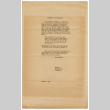
doc
Cooperative Colonization (ddr-sbbt-2-27)
A proposal to incentivize incarcerees to leave the concentration camps by investing in land, farming equipment, and other materials for Japanese Americans to establish "colonies in fertile land suitable for agriculture."

vh
An Oral History with Norman Y. Mineta (ddr-csujad-29-55)
Japanese American congressman, representing the Thirteenth Congressional District of California, born and raised in San Jose, California, discusses his early life, graduation from the University of California, Berkeley, and receiving a commission and serving in the armed forces from 1953-1956. Recalls the removal, "relocation," and incarceration of Japanese Americans during World War II at the Heart …
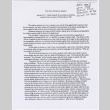
doc
"The Race Problem in America" (ddr-densho-122-435)
Report written by T. Blake Kennedy, Judge at Heart Mountain resisters' trial
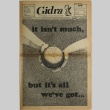
doc
Gidra, Vol. I, No. 9 (December 1969) (ddr-densho-297-9)
Selected article titles: "Asian Americans to March for Peace" (p. 2), "U.S. to Return to Okinawa" (p. 2), "Arm Busted at UCLA" (p. 3), "Hi Pot Victory!" (p. 3), "A Requiem for O.C." (p. 7), "The Conscientious Objector" (p. 11), "Change the Draft" (p. 11).

doc
Gidra, Vol. I, No. 7 (October 1969) (ddr-densho-297-7)
Selected article titles: "Issei Centennial" (p. 2), "Introspect" (p. 3), "Okinawa" (p. 5), "Shhh!: A Nisei Is Speaking" (p. 6), "The Emergence of Yellow Power in America" (p. 8-9).
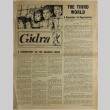
doc
Gidra, Vol. I, No. 1 (April 1969) (ddr-densho-297-1)
Selected article titles: "The Third World: A Response to Oppression" (p. 1), "A Commentary on the Noguchi Firing" (p. 1), "Yellow Power!" (p. 2).
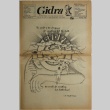
doc
Gidra, Vol. I, No. 8 (November 1969) (ddr-densho-297-8)
Selected article titles: "Moratorium Day" (p. 2), "1969 Internal Security Act" (p. 2), "Pioneer Center Opens in Little Tokyo" (p. 3), "Yellow and Proud" (p. 5), "Revelance of Ethnic Studies" (p. 5), "The High Cost of Saving Face the American Way" (p. 8-9).
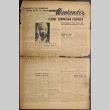
doc
The Nisei Weekender, Vol. 1, No. 19 (May 2, 1946) (ddr-densho-358-3)
Selected article titles: "Claims Commission Proposed" (p.1, 4), "Community to Be Mobilized to Supply Relief to Japan" (p.1), "Kuroki to Represent JACL Veterans in Protest Against Discriminatory Acts" (p.1), "Nisei March in First May 1 Parade in 5 Years" (p.3).
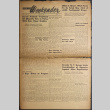
doc
The Nisei Weekender, Vol. 1, No. 20 (May 9, 1946) (ddr-densho-358-4)
Selected article titles: "Kuroki Protests Treatment of Minority Vets in Parley with Gen. Omar Bradley" (p.1, 4), "Amemiya Billed for Ball Show" (p.1), "Hasty Deportation: 2 Days Given to Prepare" (p.1), "Greater N.Y. Group Seeks Coordination of Agencies Against Alien Deportation" (p.1), "Home Is the Soldier" (p.2).
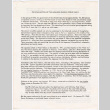
doc
The Evacuation of the Japanese During World War II (ddr-densho-390-141)
An essay describing the evacuation of Japanese and Japanese Americans during World War II, including a list a recommended further readings.
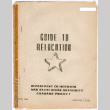
doc
Guide to Relocation (ddr-densho-390-147)
A guide for detainees "to supply essential information... in working out their relocation plans." Also included is a transcription of a speech by James G. Lindley, a list of relocation offices, and a map with detainee relocation destinations.
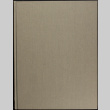
doc
American Concentration Camps VOLUME 6 June, 1942- December, 1942 (ddr-densho-372-6)
Volume 6 divides into six sections. Description about this volume reads directly from the book as follows: Section 1 presents archival documents from June 1942 that show the first major modifications of relocation policies and depict the resistance by Western Defense Command to any amelioration of the condition of the Japanese Americans. Section 2 contains selected …
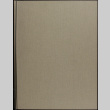
doc
American Concentration Camps VOLUME 5 May, 1942 (ddr-densho-372-5)
Volume 5 divides into two sections. Description about this volume reads directly from the book as follows: The first half of volume 5 includes archival documents from May 1942 which show the Army making California and the other West Coast areas "free" of Japanese, as first the Assembly Centers and then the Relocation Centers began to …
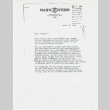
doc
Letter from Larry Tajiri to Margaret Anderson, editor of Common Ground (ddr-densho-338-449)
Letter discussing the "New Jersey evacuee situation."
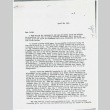
doc
Letter to Larry Tajiri from Margaret Anderson, editor of Common Ground (ddr-densho-338-448)
Letter discussing the "New Jersey evacuee situation."
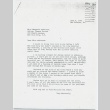
doc
Letter from Larry Tajiri to Margaret Anderson, editor of Common Ground (ddr-densho-338-430)
Larry Tajiri discusses his travels to Camp Shelby, New Orleans, and Jerome concentration camp. He is disturbed by "the sight of Jim Crow cars and the white-colored segretation." Also sends a list of books he would like to receive from the Common Council.
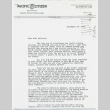
doc
Letter from Larry Tajiri to Margaret Anderson, editor of Common Ground (ddr-densho-338-439)
Larry Tajiri responding to Margaret Anderson's proposal to write a new piece on the Japanese American situation at the end of 1943. He also discusses the work of Elmer R. Smith and Barron B. Beshoar.
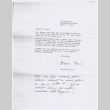
doc
Guyo Tajiri's response to a critique of her column (ddr-densho-338-135)
Discussion of racist accents regarding Judge Ito and Alfonse D'Amato.
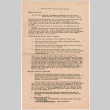
doc
American-made refugees (ddr-densho-381-3)
A report compiling reasons why the forced evacuation of Japanese-Americans from the West Coast was unnecessary and motivated by war hysteria. The report also brings up questions about the constitutionality of the evacuation, in addition to spelling out the effects the evacuation has had in terms of human suffering and economic losses. The report concludes with …
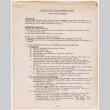
doc
Schools at the Granada Relocation Center (ddr-densho-381-42)
A paper debating if schools should be built at the Granada concentration camp.
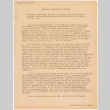
doc
Relocation problems and policies (ddr-densho-381-24)
An address delivered by War Relocation Authority Director, Dillon S. Myer, to the Tuesday Evening Club. Myer discusses a variety of topics, including the creation of the War Relocation Authority, managing the camps, and plans for relocation.
